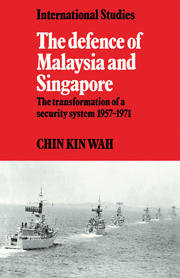Book contents
- Frontmatter
- Contents
- Preface
- Acknowledgements
- List of abbreviations
- Note on currency units
- 1 Introduction
- 2 Pre-treaty defence relations
- 3 Decolonisation and the institution of the defence agreement
- 4 The extension of AMDA
- 5 The external testing of AMDA
- 6 Towards a closing of ranks
- 7 The fractured axis
- 8 Britain weighs anchor
- 9 From AMDA to the five-power defence system
- 10 Conclusions
- Postscript on five-power arrangements
- Notes
- Bibliography
- Index
8 - Britain weighs anchor
Published online by Cambridge University Press: 07 October 2011
- Frontmatter
- Contents
- Preface
- Acknowledgements
- List of abbreviations
- Note on currency units
- 1 Introduction
- 2 Pre-treaty defence relations
- 3 Decolonisation and the institution of the defence agreement
- 4 The extension of AMDA
- 5 The external testing of AMDA
- 6 Towards a closing of ranks
- 7 The fractured axis
- 8 Britain weighs anchor
- 9 From AMDA to the five-power defence system
- 10 Conclusions
- Postscript on five-power arrangements
- Notes
- Bibliography
- Index
Summary
AMDA's viability had depended heavily upon the British anchor role. Major shifts in Britain's East of Suez policy during the second half of the sixties had profound repercussions on this defence system. The different responses of the allies to the unfolding of British developments and their endeavours to influence the course of British policy constitute the substance of the ensuing analysis.
Continuity was emphasised in that part of the Separation Agreement extending British commitments to Singapore after 9 August 1965. Separation left intact AMDA's pre-existing structure. The defence status quo satisfied temporarily a variety of interests but, above all, reflected a continuing acceptance by Britain of its anchor role. Within the alliance, increasing discord, up to and following Singapore's separation from Malaysia, obstructed local defence collaboration. Malaysia and Singapore failed to work towards a satisfactory joint defence pact or concerted approach towards Britain over the review of AMDA. Britain's failure to influence the direction of political relations between Kuala Lumpur and Singapore engendered a certain disillusionment in the utility of its anchor role. Yet the opportunity which separation provided for a British withdrawal was not taken. The reason was not (as Denis Healey seemed to suggest) wholly because of Confrontation. Britain's military presence was also dictated by a wider East of Suez role which it was still determined to play. This necessitated overseas bases, of which Singapore was the most important.
- Type
- Chapter
- Information
- The Defence of Malaysia and SingaporeThe Transformation of a Security System 1957–1971, pp. 125 - 143Publisher: Cambridge University PressPrint publication year: 1982

